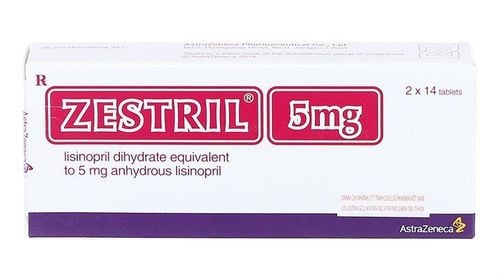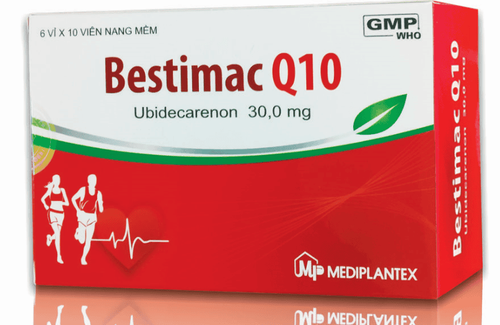This is an automatically translated article.
Enatrile 10mg is indicated for the treatment of essential hypertension in adults, renal hypertension, congestive heart failure in hemodynamically stable stage. So how to use Enatrile? Let's find out the necessary information about Enatrile through the article below
1. What is Enatrile 10mg?
Enatrile 10mg is a group drug with the ingredient Imidapril hydrochloride 10mg. Drugs manufactured by EUVIPHARM Pharmaceutical Joint Stock Company circulated in Vietnam and are registered with the registration number VD-19864-13.
Pharmaceutical name: Enatrile 10 mg Classification: Drug Ingredients: Enatrile 10mg medicine contains the main ingredient Imidapril hydrochloride 10mg other active ingredients and excipients with sufficient drug content provided by the manufacturer. Dosage form: Tablets Packing: box of 10 blisters x 10 tablets Content: Need to look carefully at the drug form and content stated on the product packaging or in the instruction sheet for exact information on the drug form and content in product.
2. Uses of Enatrile 10mg
Indications
Treatment of essential hypertension in adults. Treatment of hypertension due to chronic renal parenchymal disease (renal hypertension). Treatment of congestive heart failure hemodynamically stable stage. Dosage - Usage
Dosage:
Adults Usual dose: 5 - 10 mg/time/day. The dose may be adjusted depending on the age and symptoms of the patient.
Patients prone to hypotension after taking the first dose:
Water and electrolyte deficiencies must be treated and all diuretics being discontinued for 2 - 3 days before imidapril is given. Otherwise, treat with the first dose of 2.5 mg/day.
Patients with hypertension with heart failure:
The first dose is 2.5 mg/day and must be closely monitored.
Children There are no safety studies on the effectiveness of imidapril in children, so imidapril should not be used in children.
Other subjects Renal failure:
If Clcr: 30 - 80 ml/min: dose should be reduced, recommended starting dose 2.5 mg/day. Clcr: 10 - 29 ml/min: imidapril is not recommended. Clcr: < 10 ml/min: contraindicated use of imidapril. Hepatic impairment:
The recommended starting dose is 2.5 mg once daily.
Elderly (≥ 65 years):
Initial dose is 2.5 mg once daily, adjust dose according to patient's blood pressure response.
Maximum recommended dose: 10 mg, 1 time / day.
Usage:
Imidapril is used orally, the dose is calculated according to the hydrochloride salt form. Once a day, 15 minutes before meals, drink on time. Because the patient may experience hypotension with the first dose of an angiotensin-converting enzyme inhibitor, the first dose should be taken at bedtime. Overdose, missed dose and management
Overdose:
Symptoms of imidapril overdose include: Excessive hypotension, shock, unconsciousness, bradycardia, electrolyte disturbances and renal failure.
Treatment:
When an overdose occurs, the patient should be closely monitored, regularly checking electrolyte levels and serum creatinine levels.
Symptomatic and supportive treatment: Gastric lavage, use of adsorbents and sodium sulfate within 30 minutes.
If excessive hypotension occurs: The patient should be placed in the shock position, intravenous infusion of 0.9% sodium chloride solution. Atropine can be injected to treat bradycardia and vagus nerve overstimulation.
Consider using a pacemaker. Hemodialysis can remove imidapril and imidapril from the circulation, however, the use of membranes with a high filtration coefficient should be avoided.
Missed dose and treatment:
If you forget to take a dose, take it as soon as possible. However, if it is almost time for your next dose, skip the missed dose and take your next dose at the scheduled time. Do not take double the prescribed dose.
3. Side effects of Enatrile 10mg
Common:
Headache, dizziness, fatigue, somnolence. Dry cough, nausea. Uncommon:
Palpitations . Cerebrovascular disorders, syncope, paresthesia. Rhinitis. Vomiting, epigastric pain, digestive disorders. Skin rash, itching. Bronchitis, viral infection, upper respiratory infection. Chest pain, limb pain, edema (joint, peripheral). Increased serum potassium concentration, increased serum creatinine concentration, increased serum urea concentration, increased ALAT, increased gamma-GT. Rare:
Leukopenia, anemia. Increased blood amylase, increased ASAT, decreased serum albumin, increased alkaline phosphatase, decreased serum protein, decreased renal function.
4. Notes when using Enatrile 10mg
Contraindications
Do not use the drug in the following cases:
History of severe hypersensitivity to imidapril or other angiotensin-converting enzyme inhibitors. History of angioedema associated with angiotensin-converting enzyme inhibitors. Hereditary or idiopathic angioedema. Pregnant women in the second and third trimesters of pregnancy. Severe renal impairment requiring or not requiring hemodialysis (ClCr < 10 ml/min). Concomitant use with aliskiren in patients with diabetes mellitus or renal impairment (GFR < 60 ml/min/1.73 m2). Concomitant use with dextran cellulose sulfate for LDL-lowering treatment. Note/Caution
Caution is advised in patients with severe kidney disease, patients with bilateral renal artery stenosis.
With caution in the following patients because of the potential for temporary but severe hypotension after initiating treatment with imidapril, a lower dose should be initiated, followed by a gradual increase in dose, with close monitoring:
People with severe hypertension. People on dialysis. People taking diuretics (especially those starting to take diuretics). People who are following a strict salt diet. May cause dizziness, dizziness due to low blood pressure. Do not use medicine within 24 hours before surgery. The drug may cause hypersensitivity manifestations such as angioedema of the tongue, glottis and larynx, causing difficulty breathing. Use with caution in the elderly and children.
Be careful with people with cerebrovascular disorders (strong hypotension can cause a lack of blood flow to the brain, making the patient's condition worse).
Precautions for pregnant women
Like other ACE inhibitors, imidapril is not recommended for use during the first trimester of pregnancy due to a slight increased risk of teratogenicity. When pregnancy is detected, the use of angiotensin-converting enzyme inhibitors should be stopped immediately and replaced with another drug.
Use of angiotensin-converting enzyme inhibitors during the second and third trimesters of pregnancy can be toxic to the fetus (decreased renal function, low amniotic fluid, delayed ossification of the skull) and the neonate (renal failure, hypotension, hyperkalemia).
Note to lactating women
Lactating women should not take imidapril. If imidapril is considered necessary for the mother, breast-feeding must be stopped during the time the mother is taking the drug.
Caution when driving and operating machinery
The hypotensive effect of imidapril can cause dizziness or lightheadedness, patients should be careful when driving and operating machinery.
5. Drug interactions
Interactions with other drugs
Antihypertensives of beta-blockers, DHP-derivative calcium channel blockers: Concomitant use with imidapril increases the antihypertensive effect.
Non-steroidal anti-inflammatory drugs (NSAIDs): Concomitant use of imidapril may reduce the antihypertensive effect, increase the risk of adverse renal effects (acute renal failure, hyperkalemia) especially in patients with impaired previous renal function.
Lithium: Concomitant use with imidapril, increases the concentration of lithium in the blood leading to lithium toxicity.
Epoetin: Epoetin causes an increase in blood pressure, therefore, concomitant use with imidapril reduces the antihypertensive effect of imidapril.
Potassium-sparing diuretics, potassium-containing supplements: Concomitant administration of imidapril increases serum potassium, especially in patients with concomitant renal failure.
Other diuretics: Concomitant use with imidapril can cause severe hypotension, renal failure, especially acute renal failure when using the first dose of imidapril, especially when diuretics are used in high doses. It also causes hypokalemia.
Antidiabetic drugs (insulin, sulfonamides): Concomitant use with imidapril may increase the hypoglycemic effect.
Interactions with food
High-fat foods reduce the absorption of imidapril.
Drug interactions can change how the drug works or increase the effect of side effects. This document does not cover all possible drug interactions. Write a list of all the medicines you are taking (including prescription, nonprescription and dietary supplements) and show them to your doctor or pharmacist.
Please dial HOTLINE for more information or register for an appointment HERE. Download MyVinmec app to make appointments faster and to manage your bookings easily.













